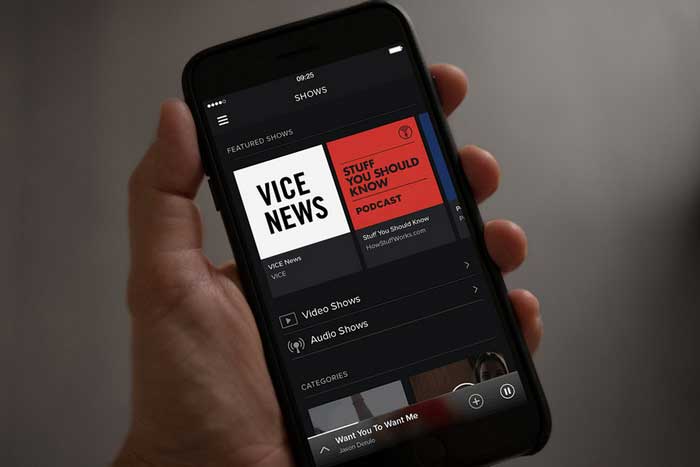Spotify is determined to be the streaming king of all audio, not just music.
The growth of Spotify continues this week as the company announces the purchase of two huge podcast companies. Gimlet Media, a leading producer of content including shows such as Homecoming (recently made into a television series by Amazon) and Reply All, as well as Anchor, a platform that helps creators with tools to build, publish, and monetize podcasts, was purchased by the streaming giant for an undisclosed amount.
In a post to Spotify’s company blog, CEO Daniel Ek used the acquisition news to detail his ambitious plan to grow the company’s stake in the podcast market throughout 2019. “In just shy of two years, we have become the second-biggest podcasting platform,” Ek wrote. “Our podcast users spend almost twice the time on the platform, and spend even more time listening to music.”
Ek also described the state of the audio market as a whole, noting how consumers spend roughly the same amount of time streaming audio as they do video, but the value of the two services differs greatly. The video industry is almost a trillion dollar market, but the music and radio industry is worth around a hundred billion dollars. “I always come back to the same question,” Ek writes, “Are our eyes really worth ten times more than our ears? I firmly believe this is not the case. For example, people still spend over two hours a day listening to radio — and we want to bring that radio listening to Spotify, where we can deepen engagement and create value in new ways. With the world focused on trying to reduce screen time, it opens up a massive audio opportunity.”
With the purchase of Gimlet Media and Anchor, not to mention Ek’s plan to invest up to $500 million into the podcast marketing throughout the year, Spotify is now in the business of content creation. How that effects current and future shows produced by Gimlet remains to be seen, but it could result in exclusivity that draws listeners away from Apple podcasts and other competing platforms.
“Based on radio industry data,” Ek notes, “we believe it is a safe assumption that, over time, more than 20% of all Spotify listening will be non-music content. This means the potential to grow much faster with more original programming — and to differentiate Spotify by playing to what makes us unique — all with the goal of becoming the world’s number one audio platform.”
Though not stated, other reasonable explanations for the acquisitions include:
- Doubling the amount of content available on the platform
- Grabbing a share of ad revenue as more advertisers abandon terrestrial radio for podcasts
- Playing a role in creating the next headline-making podcast series or helping that show reach a broader audience
- Better revenue-sharing possibilities. 80% of the music on Spotify comes from three major labels that likely won’t offer the company a larger share of streaming revenue anytime soon. Podcasts, by comparison, are spread across a vast marketplace of publishers, including The New York Times and NPR.
- A chance to quickly become the leader in the podcast marketplace. Apple currently reigns in podcasts because of its popularity in the US, but 80% of consumers outside the country use other operating systems (Android, Google, etc.).
But make no mistake, music fans. Spotify remains committed to the audio that made them a household name. Ek believes these acquisitions, as well as the creation of original content, will give the company greater leverage in negotiations that will ultimately benefit creators as much as they do the platform.

